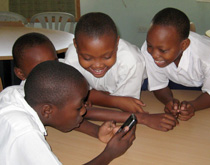
Hatem Alismail approaches the classroom, feeling nervous, much like when he first landed in Dar es Salaam, Tanzania. The small aircraft had jolted onto a short landing strip of sand instead of a smooth runway of asphalt. There was a momentary gasp until the plane came to a stop. Since then, he has been too involved in his work to be bothered by anything. But now, 10 weeks later, he is about to find out whether his time in the African city has been worthwhile.
Alismail, who just earned his computer science degree from Carnegie Mellon's Qatar campus, was there with four other students as part of the university's inaugural internship team of iSTEP, or Innovative Student Technology ExPerience. It's a program of TechBridgeWorld, a research group at Carnegie Mellon that strives to implement technology solutions to problems facing underserved communities around the world. For this first internship in Dar es Salaam, Alismail was tasked with creating a literacy aid to help young scholars improve their English, an essential skill to be successful in modern day Tanzania.
Noting the lack of computers, Alismail—who will pursue his graduate studies at the Pittsburgh campus—developed along with his team members an English grammar application for mobile phones, which seemed to be a common possession among teachers. He incorporated into the program the ubiquitous local passion for soka, better known as soccer in the United States. If a student could correctly parse the structure of a sentence, the animated player would be rewarded by scoring a goal with the crowd going wild. Alismail counts on the children's love for soka to make his application a winner. He is about to find out.
There is a tangle of eager elbows and craning heads as the children jostle around one of the mobile phones Alismail has handed out. They watch a classmate try to pick the grammatically correct answer. Alismail can't see the student's response but knows from the chorus of groans that he has answered incorrectly. "Pole, pole," they shout sympathetically, the Swahili word Alismail has learned means, "Sorry."
The young students then cheer for the next player, and, sure enough, his answer elicits a far different response. The youngsters simultaneously raise their arms victoriously, proclaiming to each other and to Alismail: "Goal!"
—Elizabeth O'Brien



